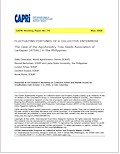| Working Paper Series |
 |
|
| Title | Fluctuating Fortunes of a Collective Enterprise: The Case of the Agroforestry Tree Seeds Association of Lantapan (ATSAL) in the Philippines | | Author | Delia Catacutan, Manuel Bertomeu, Lyndon J.Arbes, Caroline E.Duque and Novie Butra | | Year | 2008 | | Publisher | CGIAR Systemwide Program on Collective Action and Property Rights (CAPRi) | | City of Publication | Washington, DC, USA | | Series Number | CAPRi Working Paper No. 76 | | Number of Pages | 21 | | Call Number | WP0104-08 | | Keywords | Collective action, Niche marketing, Agroforestry seeds |
|
| Abstract: |
| The Agroforestry Tree Seeds Association of Lantapan (ATSAL) in Bukidnon province,
southern Philippines was organized in 1998, facilitated by the World Agroforestry
Centre (ICRAF). Farmers were trained on germplasm collection, processing and
marketing of agroforestry tree seeds and seedlings. ATSAL has been marketing
various tree seeds and seedlings with apparent success, and has provided training
on seed collection and nursery management to farmers, government technicians,
and workers from non-government organizations (NGOs). This paper reports on the
initial results of an on-going study to assess the effectiveness of ATSAL’s marketing
strategy, including group dynamics, and the issues and challenges the group faces.
It was found that during the first two years, ATSAL’s market share of greatly
demanded timber tree species increased significantly, thus helping to disseminate
widely these important species among farmers. ICRAF’s technical back-up was an
advantage, increasing the Association’s market credibility. Subsequently, ATSAL
extended its market to the central Philippines, but failed to meet the demand for
seeds due to organizational limitations. Market competition exists, where a nonmember
was able to take a larger market share than was the group. Nonetheless,
ATSAL has established its name as a viable community-based seed and seedling
producer, maintaining a stronghold in local and regional markets. Collective action
is important for smallholders to break in, and gain market access, but is unlikely to
sustain without effective leadership and some facilitation (in some cases even ongoing),
thus requiring expenditures on repairs and maintenance through continuous
technical and leadership training for the collective, and technical back-up and
facilitation by an intermediary. Finally, facilitating smallholder collective action is
essentially an arduous task, requiring the supporting agency to hold a firm grasp of
market realities, to invest in the maintenance of collective action, to provide
continuous technical back-up, and to ascertain the conditions that make collective
action succeed. |
|